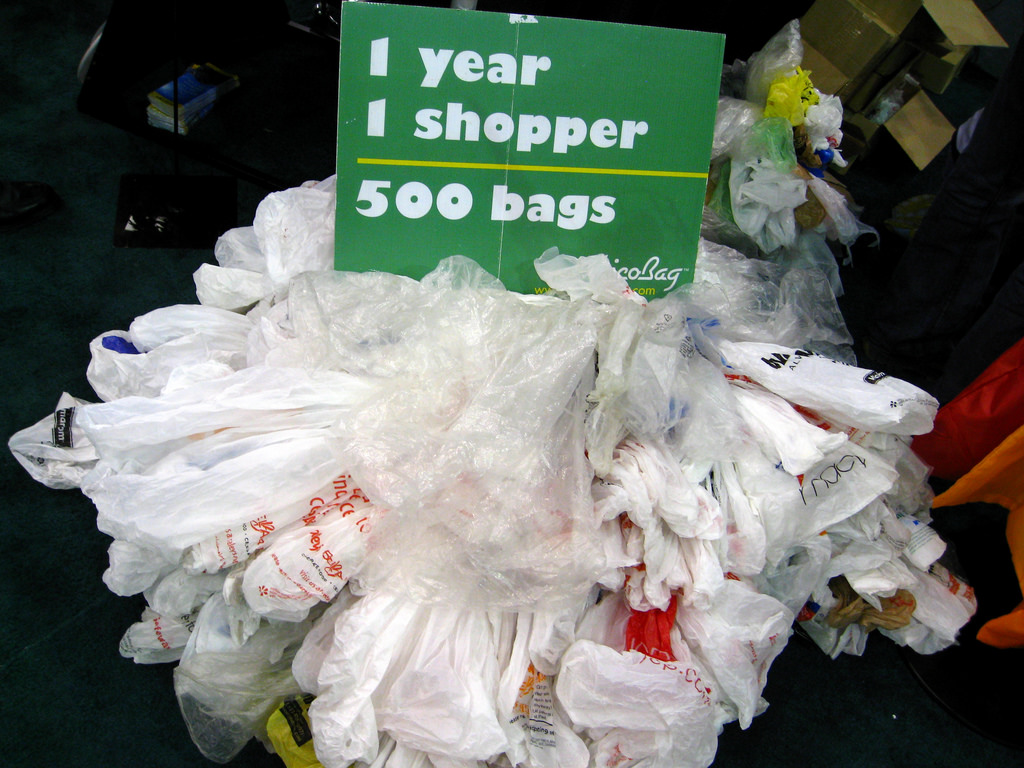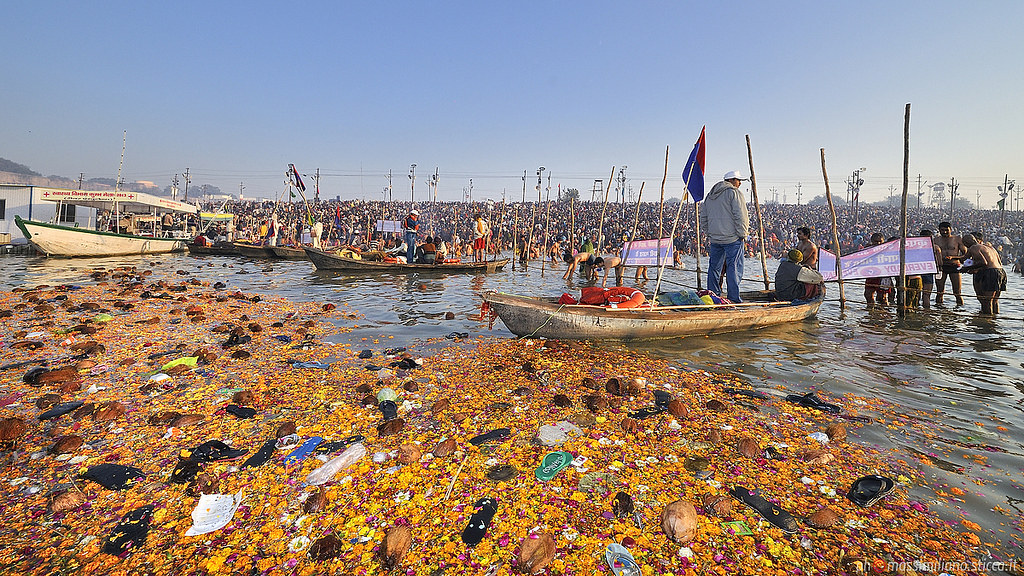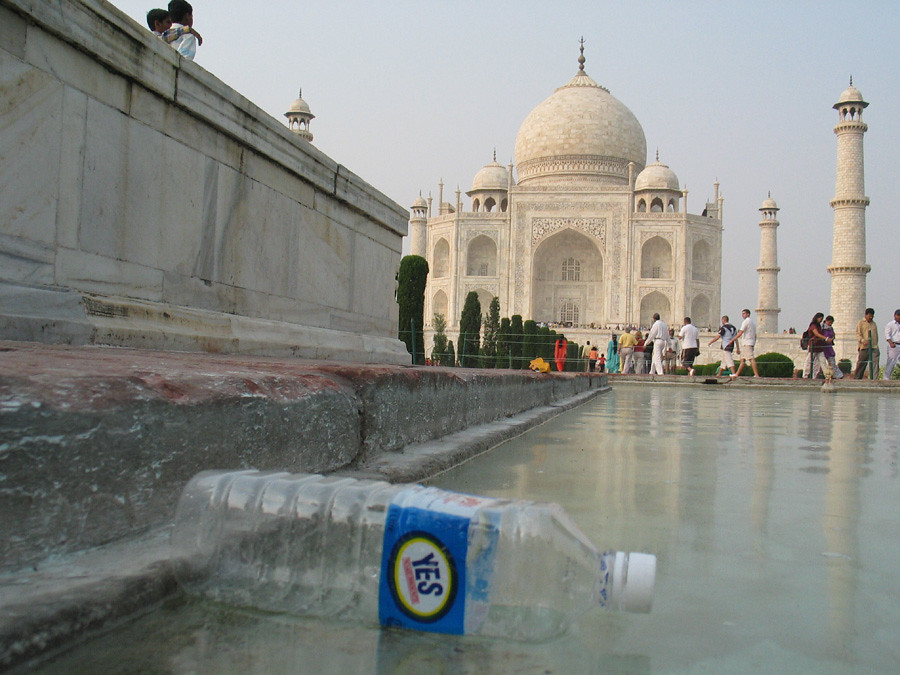每年6月5日是世界環境日。不同於地球日,世界環境日始於1970年4月22日的草根運動和環境教育活動,由聯合國於1974年訂定。但今年,這兩個特殊日子有個共同的主題——對抗塑膠污染。
每年世界環境日的全球主辦國都不同,今年輪到印度。在這天,印度發起了一系列歷史性的活動,從全國大清掃到各邦、各大學和國家公園的一次性塑膠禁令。印度目前有13億人口,該國環境部長也在此時呼籲:「如果每個印度人每天實踐一項綠色行動,就能為國內帶來革命性的變化。」
為了世界環境日,印度政府更表示將清理多達100個歷史古蹟,包括世界知名的泰姬瑪哈陵。
世界環境日行動號召 拒絕你不能重複使用的東西
全球在世界環境日進行了3000多場慶祝活動。聯合國秘書長古特雷斯表示,2018世界環境日主題「對抗塑膠污染」是一個行動號召,邀請每個人思考如何改變我們的生活習慣,減輕塑膠對自然、海洋、野生動物和我們自身健康的影響。雖然塑膠有許多重要用途,但我們已經過度依賴一次性或免洗塑膠,造成嚴重的環境後果。
「我們的世界被有害的塑膠廢棄物淹沒,」古特雷斯說,「每年有超過800萬噸塑膠進入海洋。海洋中的微塑膠現在超過了我們星系中恆星的數量。從偏遠的島嶼到北極,無處不在。如果目前的趨勢繼續下去,到了2050年,海洋中的塑膠將比魚還多。」
「世界環境日的訊息很簡單:拒絕一次性塑膠。拒絕你不能重複使用的東西,我們可以一起走向更乾淨、更綠的世界。」
印度環境森林和氣候變遷部長瓦德漢(Harsh Vardhan)呼籲國家和國際層級的所有利害關係者努力改善環境。瓦德漢表示,對印度而言,對抗塑膠污染不僅僅是口號,印度嚴肅看待這個議題。
瓦德漢指出,印度每天產生2.5萬噸塑膠垃圾;在印度,塑膠消費總量有70%被當作垃圾丟棄。
人造材料的最大宗 環境中累積達83億公噸
根據2017年由美國喬治亞大學科學家主持的研究,人類自1950年代開始量產合成材料以來,共製造出83億公噸的塑膠,其中大部分現在在垃圾掩埋場或自然環境中。
全球一年塑膠產量更從1950年代的200萬公噸,增加到2015年的4億多公噸,超過大多數其他人造材料。
到2015年,人類總計已經生產了83億公噸塑膠,其中63億噸已經成為廢棄物。這些廢棄物中只有9%被回收,12%被焚燒,79%在垃圾掩埋場或自然環境中累積。科學家估計,如果照目前的趨勢繼續下去,到2050年將有大約120億公噸塑膠垃圾進入垃圾掩埋場或自然環境。
環境部長喊話:每位印度人每天一個綠行動
瓦德漢與各國環境部長談話時斷言,沒有任何垃圾不能轉化為財富。
他舉卡什普爾市一間工廠為例,這間工廠已將10噸生物質轉化為3000公升乙醇。瓦德漢呼籲已開發國家提供技術、資金和研究成果來解決這個環境問題,並要求各國環境部長鼓勵民眾採行綠色優良行動,發起小型的社會運動。
「如果每個印度人每天實踐一項綠色行動,就能為國內帶來革命性的變化。」瓦德漢表示。
減塑政策多元多面向 全球60多國個案報告
印度總理莫迪和聯合國環境規劃署執行董事梭雷(Erik Solheim)在今年世界地球日上共同發表「一次性塑膠:永續性藍圖」(Single-use Plastics: A roadmap for Sustainability)報告。這份報告在印度政府和環境森林和氣候變遷部的協助下完成,蒐集來自全球超過60個國家的個案報告。
報告顯示,全球對抗塑膠污染的動能強勁,各國政府正加快步伐和行動範圍,以減少一次性塑膠的使用。
報告提出許多建議,包括政策制定者可以採取哪些具體行動來改善廢棄物管理、推廣環保替代品、教育消費者、實施自願減排的策略,以及如何成功禁用或針對一次性塑膠的使用和銷售課稅。
梭雷說:「研究顯示,減塑行動可以無痛且有利可圖,避免昂貴的下游污染成本,為人類和地球帶來利益。他在報告的前言中寫道:「塑膠不是問題。端看人類如何使用之。」
World Environment Day, celebrated on June 5 each year since the United Nations established it in 1974, is not Earth Day, which started as a grassroots movement and environmental teach-in on April 22, 1970, but this year both special days have the same theme – eliminating plastic pollution.
Each year a different nation acts as the global host for world Environment Day – this year it's India.
As host of World Environment Day 2018, India today launched an historic slate of activities from nationwide clean-ups, to single-use plastic bans across states, universities and national parks.
For World Environment Day, the government of India says it will clean up 100 of its historic monuments, including the world-famous Taj Mahal.
More than 3,000 World Environment Day celebrations are underway across the planet today.
The World Environment Day theme for 2018, “Beat Plastic Pollution,” is a call to action, and it invites everyone to consider how we can make changes in our lives to reduce the heavy burden of plastic pollution on our natural places, our oceans, our wildlife, and our own health.
While plastic has many valuable uses, we have become over-reliant on single-use or disposable plastic, with severe environmental consequences, says UN Sectretary-General António Guterres.
“Our world is swamped by harmful plastic waste,” Guterres said. “Every year, more than eight million tonnes end up in the oceans. Microplastics in the seas now outnumber stars in our galaxy. From remote islands to the Arctic, nowhere is untouched. If present trends continue, by 2050 our oceans will have more plastic than fish.”
“On World Environment Day, the message is simple: reject single-use plastic. Refuse what you can’t re-use,” the secretary-general said. “Together, we can chart a path to a cleaner, greener world.”
Urging all stakeholders at both national and international levels to work towards betterment of the environment, India’s Minister for Environment, Forest and Climate Change Dr. Harsh Vardhan said that to India “Beat Plastic Pollution” is more than a slogan – India means business about it.
He pointed out that India generates 25,000 tonnes of plastic waste every day. In India, 70 percent of total plastic consumption is discarded as waste.
Humans have created 8.3 billion metric tonnes of plastics since large-scale production of the synthetic materials began in the early 1950s, and most of it now resides in landfills or the natural environment, according to a 2017 study by scientists at American universities led by the University of Georgia.
Global production of plastics increased from two million metric tons in 1950 to over 400 million metric tons in 2015, according to the study, outgrowing most other human-made materials.
By 2015, human beings had generated 8.3 billion metric tons of plastics, 6.3 billion tons of which had already become waste. Of that, only nine percent was recycled, 12 percent was incinerated and 79 percent accumulated in landfills or the natural environment.
If current trends continue, roughly 12 billion metric tonnes of plastic waste will be in landfills or the natural environment by 2050, the scientists estimate.
Speaking to the state environment ministers, Vardhan asserted that there is no waste which cannot be transformed into wealth. He gave the example of a plant in the city of Kashipur, where 10 tonnes of biomass has been converted into 3,000 liters of ethanol.
The environment minister called on the developed world to provide technology, funds and research results to solve this environmental problem.
He asked the state environment mininsters to inspire people to take up Green Good Deeds and build small, social movements.
“If every Indian adopts one Green Good Deed per day, a revolutionary change can be brought about in the nation,” Vardhan urged.
Released today, a new report from his agency, UN Environment, finds a “surging momentum in global efforts to address plastic pollution.”
The first-of-its-kind accounting finds governments are increasing the pace of implementation and the scope of action to curb the use of single-use plastics.
“Single-use Plastics: A roadmap for Sustainability,” is a global outlook, developed in cooperation with the Indian Government and the Ministry of Environment, Forest and Climate Change. It presents case studies from more than 60 countries.
The report was launched in New Delhi today by Prime Minister Modi and Solheim on the occasion of World Environment Day.
Among the recommendations are specific actions policy makers can take to improve waste management, promote eco-friendly alternatives, educate consumers, enable voluntary reduction strategies and successfully implement bans or levies on the use and sale of single-use plastics.
“The assessment shows that action can be painless and profitable, with huge gains for people and the planet that help avert the costly downstream costs of pollution,” said Solheim. In the report’s foreword he writes, “Plastic isn’t the problem. It’s what we do with it.”
※ 全文及圖片詳見:ENS










